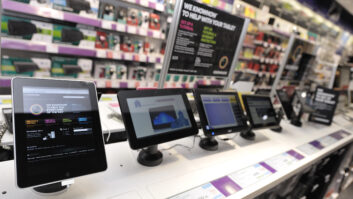Lake Las Vegas, Nev. — Major TV and CE manufacturers see some improvement at retail and opportunities for well-focused suppliers and retailers during a time of economic downturn and consolidation in the industry.
That seems to be the consensus view of some top manufacturers who visited with TWICE during the annual PRO Group meeting, held here May 19-21.
Top executives from JVC, Mitsubishi, Sharp, Samsung and Toshiba shared views with TWICE during the
meeting on the state of retail and the ongoing effect of the departure of Circuit City on the market, possible product shortages of TVs and other categories, and what opportunities may be out there for retailers of all sizes.
Tim Baxter, president, Samsung consumer electronics division, said that while retail went through “a pretty rough cycle” since last fall, “interestingly, we see TV as being the bellwether for the CE industry.”
Baxter said Samsung sales figures show the first 10 weeks of the year were up 25 percent for the company, while the last 10 weeks there has been “a slowdown to more high-single-digit growth. There is clearly a correction in demand that impacted every channel.”
He said the reason is the usual transition of lines during this time of year has slowed growth. But Baxter, as did other vendors, reported “high unemployment figures are a concern. We see some signs of the economy bottoming out, but unemployment lingers.”
Mike Troetti, president, Sharp
Marketing Corp. of America, said that in TVs, “retail seems to be healthy overall. Some large chain stores are showing increases, but A/V retailers are grabbing a portion of the business. Some of these retailers that are
healthy are expanding and doing good business. That’s a combination of one less national retailer, better service and attention to customers when they walk in the door. A/V retailers have learned how to differentiate themselves.”
Max Wasinger, Mitsubishi Digital America, sales and marketing senior VP, commented that its business “has been remarkably strong. We are in niche areas, and not a commodity business. We focus on [A/V retailers] and appreciate them. They know that [Mitsubishi’s DLP line] is not a flat-panel commodity. They appreciate LaserVue and our Unisen products. They like big-screen TVs that are a great value to home-theater systems.”
Asked how the absence of Circuit City is playing in the market, in terms of retailers getting more market share and vendors looking at different channels, Scott Ramirez, television marketing VP for Toshiba, commented, “That is playing out right now. Existing dealers are getting share. It isn’t just one [retail] channel.”
He added, “With Circuit out of business, there are commercial real estate spots for regional retailers to move in. The stronger regional players are taking business, along with Best Buy, Wal-Mart and Amazon.”
Bob Scaglione, product and marketing group manager/senior VP of Sharp, said, “A lot of retailers claim that
they have taken part of the Circuit City business, and are positive about it. Some [consumers] have begun to be attracted to smaller, local retailers for choice and customer service.”
Troetti of Sharp added, “Some consumers are trying different shopping experiences. During hard economic times you go back to brands and long-standing retailers who will be there. But others say, ‘Where can I go to save a buck?’ ”
Craig Geiger, JVC’s executive VP/COO said that with Circuit out of the picture, “There are opportunities for retailers to make a good first
impression. Regional and independent dealers should go with their core strengths. They should become technology leaders in their areas, and create an experience for the consumers that is backed with plenty of service and support.”
After a very tough holiday season and bleak fiscal year performances CE manufacturers have said that accurate sales projections are critical. Some vendors said product shortages in the second half might be possible as business improves.
Samsung’s Baxter said, “If you look at what transpired the last six months, large retailers backed off. So did manufacturers until you push it upstream to the component makers. Business in the first two months was OK. We have seen that the supply chain for TVs, Blu-ray and others is more flexible for some than for others.”
Jonas Tanenbaum, marketing VP for flat-panel TVs for Samsung, noted in that category, “Stabilization is taking place now, with a flattened, but strong growth rate in the single digits for TVs, which is predictable” and should help product availability.
Troetti agreed. “Everyone pulled level back on production, retailers sensed problems in October and they cut back before the crash hit. Then we pulled back and the change rolled on … to the panel makers.” He said 32-inch flat panels will be short through the summer due to “rapid price declines” and that there are “bidding wars” for supplies of flat-panel glass.
Toshiba’s Ramirez mentioned the bright spot that TV sales “have remained strong in this recessionary environment. There is 36, 37 percent increases in sell-in and sell-through. Some [sales] have been caused by aggressive pricing — demand is there when there is a value.”
However, Ramirez noted, “There will be shortage of LCD panels” through July. He explained, “Production was cut, but not as much as some feared.”
And while some complained about the U.S. government coming up with $40 coupons for DTV converter boxes, the Toshiba exec said one factor in possible HDTV shortages may be “that China decided to subsidize the purchase of flat-panel TVs.”












